
npj Vaccines
Scope & Guideline
Empowering Global Immunization Insights
Introduction
Aims and Scopes
- Vaccine Development and Innovation:
Research related to the design, formulation, and testing of new vaccine candidates, including mRNA, viral vectors, and protein-based vaccines. - Immunogenicity and Efficacy Studies:
Studies assessing how well vaccines work in producing an immune response and their effectiveness against specific diseases or variants. - Vaccine Safety and Pharmacovigilance:
Investigations into the safety profiles of vaccines, including adverse effects and long-term health outcomes post-vaccination. - Public Health and Vaccination Strategies:
Research on vaccine uptake, hesitancy, and strategies to improve public health outcomes through vaccination. - Targeted Vaccination Approaches:
Exploration of novel delivery systems and targeted vaccination methods, including mucosal and nanoparticle-based vaccines. - Correlates of Protection:
Identification of immune markers and responses that correlate with protection from diseases, guiding vaccine development.
Trending and Emerging
- mRNA Vaccine Technology:
The rapid development and deployment of mRNA vaccines for COVID-19 have spurred increased research into this technology, leading to explorations of its application for other infectious diseases. - Vaccine Hesitancy and Public Perception:
Research into the sociocultural factors influencing vaccine hesitancy has gained importance, especially in the wake of the COVID-19 pandemic. - Targeting Emerging Infectious Diseases:
There is a significant increase in research focused on developing vaccines for emerging infectious diseases, such as Zika and Nipah virus, reflecting the need for rapid response to outbreaks. - Nanoparticle and Novel Delivery Systems:
Innovative delivery systems, including nanoparticle-based vaccines and intranasal formulations, are emerging as a prominent area of research, enhancing vaccine efficacy and accessibility. - Immunotherapy and Cancer Vaccines:
The intersection of immunotherapy and vaccine development is trending, with studies focusing on therapeutic vaccines for cancer and chronic infections. - Longitudinal Studies on Immune Response:
Increasing emphasis on long-term studies that evaluate the durability of immune responses post-vaccination, particularly in vulnerable populations.
Declining or Waning
- Traditional Live Attenuated Vaccines:
There has been a noticeable decrease in studies focusing on conventional live attenuated vaccines, as newer technologies like mRNA vaccines gain prominence. - Vaccine Development for Diseases with Established Vaccines:
Research targeting diseases that already have effective vaccines, such as measles or polio, seems to be less frequent, possibly due to saturation in this area. - Standardized Vaccine Potency Testing:
Studies on conventional methods for assessing vaccine potency are becoming less common, as more innovative and efficient testing methods are developed. - General Vaccine Adjuvant Research:
Research into generic adjuvants is diminishing, with a focus shifting towards specific adjuvants tailored for particular vaccine formulations.
Similar Journals

AIMS Allergy and Immunology
Exploring Breakthroughs in Allergy ResearchAIMS Allergy and Immunology is a prestigious open access journal dedicated to advancing knowledge in the fields of allergy and immunology. Published by the American Institute of Mathematical Sciences (AIMS), this journal provides a vibrant platform for researchers, practitioners, and scholars to share groundbreaking findings and insights. Recognized for its commitment to disseminating high-quality research since its inception in 2017, AIMS Allergy and Immunology contributes significantly to the understanding of complex immunological mechanisms and allergic responses, thus playing a pivotal role in enhancing clinical practices and therapeutic strategies. With its ISSN 2575-615X, the journal aims to facilitate a robust exchange of ideas and promote collaboration within the scientific community. Researchers and practitioners are encouraged to access the latest studies and reviews, which are all freely available online, ensuring that vital information reaches a global audience without barriers. Together, we can tackle the challenges posed by allergies and immune disorders through rigorous scientific inquiry and innovation.
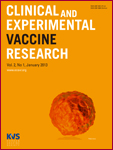
Clinical and Experimental Vaccine Research
Connecting researchers to revolutionize vaccination efforts.Clinical and Experimental Vaccine Research, an esteemed journal published by the Korean Vaccine Society, serves as a vital platform for disseminating groundbreaking research in the fields of Immunology, Infectious Diseases, and Public Health. Since its inception in 2012, this open-access journal has been committed to advancing knowledge and fostering collaboration among professionals dedicated to vaccine development and evaluation. With an impactful presence and a Q3 ranking in several categories on the Scopus index, it reflects a robust commitment to quality, evidenced by its placement within the 41st to 59th percentiles across multiple disciplines related to medicine and health. Situated in Seoul, South Korea, at the Department of Pediatrics, Yonsei University Severance Children's Hospital, the journal not only provides a crucial resource for researchers and practitioners but also enhances the global discourse on vaccination strategies and public health interventions. By contributing to the ongoing dialogue in vaccine research, this journal plays an essential role in shaping future health policies and practices.
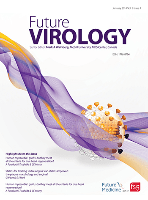
Future Virology
Pioneering the Next Wave of Virology InnovationsFuture Virology, published by Future Medicine Ltd, is an essential journal dedicated to advancing the understanding of virology in the contemporary scientific landscape. With an ISSN of 1746-0794 and an E-ISSN of 1746-0808, this journal serves as a platform for researchers and practitioners in the field to publish high-quality, peer-reviewed articles that explore novel discoveries, innovative therapeutic strategies, and the implications of viral research on global health. Operating from the United Kingdom and maintaining a commitment to rigorous scientific inquiry, Future Virology is categorized in the Q4 Quartile for Virology according to the latest Scopus rankings, with a position of Rank #48/80 and a percentile of 40th in the Virology category. Although it currently does not offer open access, the journal strives to disseminate critical insights that benefit a wide range of professionals, researchers, and students engaged in virology and related fields. By bridging the gap between basic research and practical applications, Future Virology plays a crucial role in fostering innovation and collaboration in the ever-evolving virology landscape.

Eurosurveillance
Connecting professionals to pivotal public health findings.Eurosurveillance is a prestigious journal dedicated to the field of epidemiology, public health, and infectious diseases, published by the European Centre for Disease Prevention and Control since 1996. With an impressive Q1 ranking across various categories, including Epidemiology and Public Health, it consistently stands at the forefront of research dissemination, making it an invaluable resource for researchers, professionals, and students alike. The journal boasts an outstanding reputation, as evidenced by its Scopus rankings, where it ranks in the top 1% to 3% in multiple relevant categories. As an Open Access publication, Eurosurveillance ensures that vital findings are freely accessible to a global audience, fostering collaboration and innovation in the fight against infectious diseases. With a dedicated reach from 2001 to 2024, the journal addresses contemporary challenges in public health and virology, reinforcing its significance in shaping policies and research initiatives across the world.

Tropical Diseases Travel Medicine and Vaccines
Advancing global health through innovative research.Tropical Diseases Travel Medicine and Vaccines, published by SPRINGERNATURE, stands at the forefront of research in the fields of infectious diseases and public health, with an impressive impact factor that signifies its relevance and influence. Since its inception in 2015, this peer-reviewed journal has maintained an open access policy, ensuring that cutting-edge research on tropical diseases and travel medicine is readily available to researchers, professionals, and students worldwide. The journal currently ranks in the Q2 Quartile for both Infectious Diseases and Public Health, Environmental and Occupational Health, reflecting its substantial contribution to these critical areas of study. With a strong Scopus rank of #176 in Public Health and #138 in Infectious Diseases, it serves as a vital platform for innovative studies that advance understanding and response strategies related to tropical diseases. For its vast audience, Tropical Diseases Travel Medicine and Vaccines not only acts as a bridge connecting researchers with practical applications but also nurtures academic discourse essential for future advancements in global health.

REVISTA DO INSTITUTO DE MEDICINA TROPICAL DE SAO PAULO
Empowering Scholars in the Fight Against Infectious DiseasesREVISTA DO INSTITUTO DE MEDICINA TROPICAL DE SAO PAULO is a prestigious open-access journal that has been publishing significant research in the field of tropical medicine since its inception in 1961. Produced by the Instituto de Medicina Tropical de São Paulo, the journal boasts a commendable Q3 ranking in both the categories of Infectious Diseases and Medicine (miscellaneous), as per the latest 2023 metrics. With an ISSN of 0036-4665 and E-ISSN of 1678-9946, it serves as a prominent platform for scholars and professionals to disseminate their findings and insights on pressing health issues prevalent in tropical regions, particularly those relevant to Brazil and beyond. This journal is essential for researchers and practitioners who seek to advance their understanding and apply innovative solutions in tropical medicine, thus addressing the distinct challenges posed by infectious diseases in diverse populations. The journal is accessible through various open access platforms, ensuring that critical research is available to a global audience, fostering knowledge sharing and collaboration.

Journal of Virus Eradication
Transforming knowledge into action against viruses.Welcome to the Journal of Virus Eradication, a premier publication dedicated to advancing the field of virology and infectious disease research. Published by MEDISCRIPT LTD, this journal provides a vital platform for sharing cutting-edge research findings in key areas including epidemiology, immunology, and public health. With an impressive classification of Q2 in Epidemiology and Infectious Diseases for 2023, this journal exemplifies a commitment to high-quality scholarship and impactful research. The Journal of Virus Eradication is instrumental in disseminating knowledge that tackles viral threats, contributing to global health initiatives aimed at virus containment and eradication. Researchers, professionals, and students alike will find this journal an invaluable resource, making significant contributions to the scientific community and society at large.
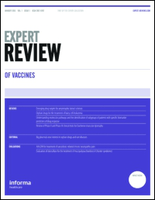
Expert Review of Vaccines
Exploring Breakthroughs in Vaccine Research and Policy.Expert Review of Vaccines, published by Taylor & Francis Ltd, is a pivotal open access journal that has established itself as a leading source of peer-reviewed articles focusing on vaccine research, development, and policy. With an impressive categorization in the top quartile (Q1) across various domains including Drug Discovery, Immunology, Molecular Medicine, and Pharmacology for 2023, this journal plays a crucial role in disseminating high-quality scientific findings that drive advances in the field. Located in the United Kingdom, it serves a global audience of researchers, healthcare professionals, and students seeking to stay abreast of cutting-edge developments in vaccination strategies and technologies. The journal’s Scopus ranks further attest to its excellence, boasting remarkable placements in Pharmacology and Drug Discovery, reflecting its impact and reach. Since transitioning to an open access format in 2023, the journal has enhanced accessibility to vital research, empowering a broader audience to contribute to and engage with the discourse surrounding vaccines. As the field of immunization continues to evolve, Expert Review of Vaccines remains a cornerstone for those committed to advancing knowledge and practice in this essential area of health science.
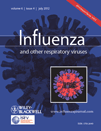
Influenza and Other Respiratory Viruses
Transforming understanding of respiratory infections.Influenza and Other Respiratory Viruses, published by WILEY, serves as a prominent peer-reviewed platform for the dissemination of research contributing to the understanding and management of respiratory viral infections. With an impressive impact factor and established as an Open Access journal since 2014, it ensures maximum visibility and accessibility of pivotal research findings in the realm of Epidemiology, Infectious Diseases, Public Health, and Pulmonary and Respiratory Medicine. Registered under the ISSN 1750-2640 and E-ISSN 1750-2659, the journal boasts Q1 rankings in four critical categories as of 2023, underscoring its significance within the scientific community. Researchers, professionals, and students can benefit from the convergence of knowledge that this journal facilitates from 2007 to 2024, fostering advancements in understanding viral pathogens and innovative treatment strategies that are increasingly vital to public health efforts globally.
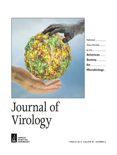
Journal of Virology
Innovating Solutions for Viral ChallengesJournal of Virology is a premier scholarly journal dedicated to advancing the field of virology, focusing on the molecular mechanisms of virus-host interactions, viral pathogenesis, and the latest therapeutic and vaccine developments. Published by the American Society for Microbiology, this esteemed journal has been a cornerstone for researchers since its inception in 1967, providing a platform for high-quality, peer-reviewed research. With a commendable impact factor indicative of its relevance and influence, the journal is categorized in the top quartile (Q1) for Virology, Microbiology, and Insect Science, reflecting its significance in these fields. Researchers can access a wealth of studies and findings that shape our understanding of viruses and their interactions with hosts, highlighting its role in both basic and applied sciences. Positioned in the United States, the Journal of Virology serves a global audience, ensuring that cutting-edge discoveries reach professionals, students, and academics alike. Join the conversation as we explore the complexities of virology and its implications for human health and disease.